RWU Stay Break Part I: A Real-World Dive into R.I.’s Food Insecurity Issues
A dozen students swapped spring break vacation for meaningful work within the community [Video]
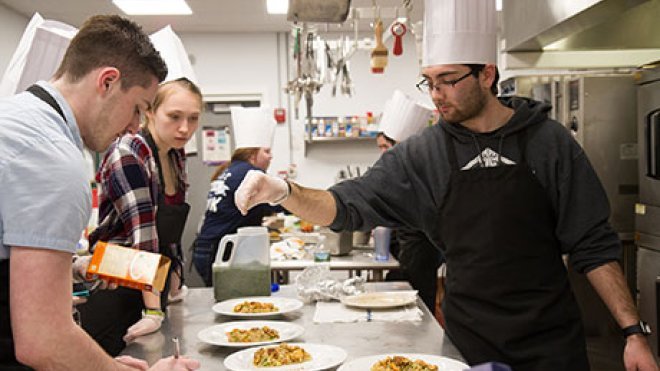
BRISTOL, R.I. – One team of students negotiated with a small-shop owner to split a carton of eggs and were lucky to get a free red onion thrown in when adding fresh chicken breast pushed them over their grocery budget. Another team debated the merits of stretching their dollars between buying the $1.50 can of chicken salad versus the $1 cans within what they could find at a convenience store. While a third team shopping at a grocery store had an array of fresh produce at their fingertips, allowing them to select plentiful, colorful vegetables for a meal.
Although this sounds like it could be a typical scenario of college students making ends meet without a full-time paycheck, it was actually a hands-on lesson in the real-world choices families living at the poverty line must make every day. As part of the “RWU Stay Break: Food Needs in R.I.” course, a dozen students swapped fun in the sun to devote their spring break week to diving deep into a public health and psychology-focused look at food insecurity issues in the Ocean State.
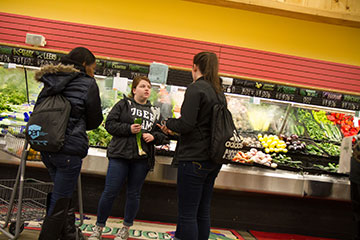 “We’re focusing on food insecurity because it’s so meaningful to so many people,” said Becky Spritz, a professor of psychology co-teaching the Stay Break course through the Honors Program and Feinstein Center for Service Learning and Community Engagement at RWU. “It’s not just about nutrition and health issues, but also the role it plays in our lives culturally, socially and emotionally.”
“We’re focusing on food insecurity because it’s so meaningful to so many people,” said Becky Spritz, a professor of psychology co-teaching the Stay Break course through the Honors Program and Feinstein Center for Service Learning and Community Engagement at RWU. “It’s not just about nutrition and health issues, but also the role it plays in our lives culturally, socially and emotionally.”
For eight days, students in the interdisciplinary course live and learn together through classroom lessons and experiential learning opportunities, bringing them face-to-face with families confronting issues of access to food, poverty and homelessness and the people working in agencies and nonprofits that support them.
Monday featured a day full of learning firsthand about government-supported food-assistance programs from the people that operate the East Bay Community Action Program in Riverside, where students also toured the Women, Infants, and Children (WIC) office, Family Center, Health Center and food pantry. To drive home what it meant to live on limited means, it was immediately followed by a lesson in budgeting meals through an Iron Chef Challenge.
With only $10 to feed a family of four (similar to what is received through the Supplemental Nutrition Assistance Program), students were tasked with planning and cooking a nutritious, delicious meal. Each team received a single shopping destination designed to get them thinking about “food deserts” – the limited access to nutritious food shopping some families face and the challenges of accessing these places on restricted public transportation or by foot in areas lacking sidewalks.
That point became crystal-clear for the team meal-planning without access to fresh foods.
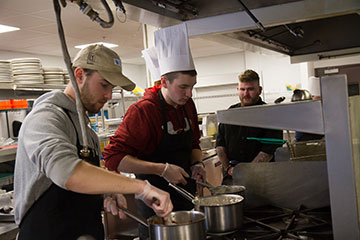 “Everything was mostly canned food and boxed food,” said Brett Lowder, a criminal justice major. “It was cheap but nutrition was tough to get shopping at this store.”
“Everything was mostly canned food and boxed food,” said Brett Lowder, a criminal justice major. “It was cheap but nutrition was tough to get shopping at this store.”
“Also, choosing food brands was a challenge,” added teammate Evan Przyborowski, a cybersecurity and networking major. “We could buy something at a higher price that’s good for you nutritionally, or something cheaper that might not be as nutritious.”
Even the team assigned to a grocery store found the budget challenging.
“We were calculating $1.99 a pound of chicken and doing the math to add up how much we could buy,” said Olivia Ryan, an engineering major. It was different from her own personal experience, she said: “At home if I go grocery shopping with my brother, we just grab whatever mom says and we just eyeball it, instead of carefully calculating what we’re spending.”
Back at RWU’s Baypoint facility, the teams benefited from an industrial kitchen and two master chefs from Bristol’s Common Pub at their disposal. Amid the hum of exhaust fans and din of enthusiastic strategizing, students in chef’s aprons and hats coordinated a clatter of chopping chicken and vegetables, while others boiled rice on professional stoves.
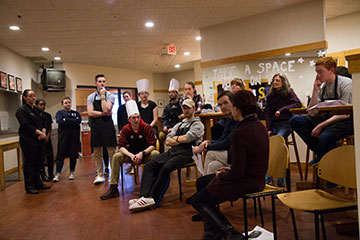 With the meals plated featuring decorative Sriracha touches, each was presented to a panel of judges from RWU and Common Pub. The teams explained their choices – all had selected chicken as the low-cost protein – and submitted the nutrition information for the judges’ consideration. Only one team could win the challenge, but they all learned valuable lessons, which they shared in the group discussion.
With the meals plated featuring decorative Sriracha touches, each was presented to a panel of judges from RWU and Common Pub. The teams explained their choices – all had selected chicken as the low-cost protein – and submitted the nutrition information for the judges’ consideration. Only one team could win the challenge, but they all learned valuable lessons, which they shared in the group discussion.
“I could see how tempting it would be for a lot of parents coming home between shifts to just pick up fast food,” said Chantelle Montminy, a biology major.
“This shows how poverty and hunger relates to obesity more than we think, because people can’t afford to buy healthy foods – more often unhealthy foods,” said Juliette Caffrey, an engineering major.
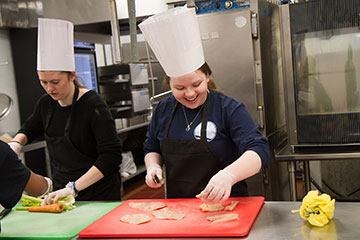 Among many of the week’s hands-on lessons, students ate “recovered” meals as part of their RWU Food Recovery Network experience, transforming end-of-day leftovers from the university dining halls into delectable dishes. They dug into real farm work and learned what food-to-plate means for local farmers and the food pantries that receive those donations. They learned about the Bristol Health Equity Zone project, a community-wide collaboration among town and school officials, business owners, nonprofits and RWU to improve access to food and address food insecurity issues. One night they prepped breakfast at Mathewson Street United Methodist Church in Providence, then sat down the next morning to break bread and strike up conversations with people facing homelessness and poverty instead of just serving the meal.
Among many of the week’s hands-on lessons, students ate “recovered” meals as part of their RWU Food Recovery Network experience, transforming end-of-day leftovers from the university dining halls into delectable dishes. They dug into real farm work and learned what food-to-plate means for local farmers and the food pantries that receive those donations. They learned about the Bristol Health Equity Zone project, a community-wide collaboration among town and school officials, business owners, nonprofits and RWU to improve access to food and address food insecurity issues. One night they prepped breakfast at Mathewson Street United Methodist Church in Providence, then sat down the next morning to break bread and strike up conversations with people facing homelessness and poverty instead of just serving the meal.
“Having these experiences made it more meaningful than just reading about these issues in articles in the classroom,” Caffrey added. “You might not realize the real-life implications of what people are experiencing. This made it more real – you realize this is how people live. It made me care more about what they are going through.”
“For me it was not only understanding this is a real issue, but how close it is to you,” said Darrell Jarrett Valenti, a math and secondary education double major. “We visited food shelters in Providence, but you know there are many food shelters between us and Providence that are filled to the brim [with people who need help]. It brings this issue into much greater and clearer focus, and you analyze your own life not only on a micro-level but also a macro-level.”
For these students, the lesson and their work continues. Based on the issues they’ve learned this week, they will propose a change in state law addressing food insecurity through an advocacy brief to be presented to state legislators on Thursday.
Read the next installment: "RWU Stay Break Part II: Advocating for the State's Food Insecure Residents"
At RWU, we develop Civic Scholars who believe in community-engaged work. That’s why we commit to providing every student an opportunity that empowers them to put their knowledge and skills to the test solving real-world problems and creating meaningful change with community partners. Learn more about the Civic Scholars program and how to help us reach our goal of every student participating in civic scholarship.